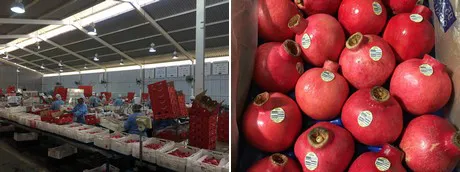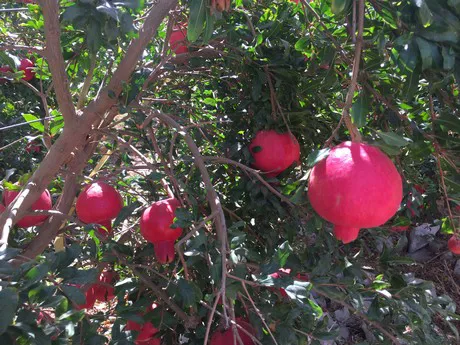Chilean pomegranate production has decreased in the past few years. This is because the Peruvian product enters the markets earlier and at cheaper prices. The Peruvians are able to fulfill the demand in Russia and the European Union, and this makes these markets very difficult to access for Chilean growers and exporters. The growing and exporting company Río Blanco, however, has been experiencing stable results in the market. The company mainly exports their pomegranates to the United States, and a small amount is exported to Japan. Nicolas Damm, commercial manager of Río Blanco says: "The Peruvian exporters still face some entry barriers when exporting to the U.S., while Chile does not. This is why Chile is able to supply the U.S."
Río Blanco has been successful in continuing their production and export of pomegranates because they stick to a low but stable volume each season. Nicolas says: “Our company is renowned for our fresh grape production, which measures about three million boxes, and our pomegranate production is the company’s smallest venture, measuring approximately 100,000 boxes, or 300 ton. We produce three varieties: the 116, the Acco and the Wonderful. Of the 300 ton we harvested this year, half was the Wonderful variety, and the other half was made up equally of the 116 and the Acco.” He explains: “The Wonderful variety is the most popular because it has a longer shelf life than the other two varieties. We also use the discarded fruit of this variety and send it to California to be made into arils. This is just for the Wonderful variety, because of the longer shelf life.”

The Chilean pomegranate market has close ties with the Californian market because the length of the Californian season greatly impacts the success of the Chilean season. Nicolas says: “In the United States, pomegranates are seen more as a winter fruit. Our season starts in February, and so if the Californian season ends early, then we can enter a clean market with good demand. This was the case this year, and our early varieties sold quite well. Later on in our season it gets into spring and then there is competition with citrus fruits and even some stone fruits. That is why the pomegranates that we sell in the spring always have lower demand.”

Nicolas concludes: “Luckily, this season went according to our market expectations. The production was stable as were the quality and condition of the fruit. This helped maintain the prices at a stable level. Another important factor was that this last season Chile exported over 30% less Pomegranates than the previous season.”
For more information:
Nicolas Damm
Río Blanco
Tel: +56 (2) 2307 4100
Email: nicolas.damm@rioblanco.net
www.rioblanco.net
